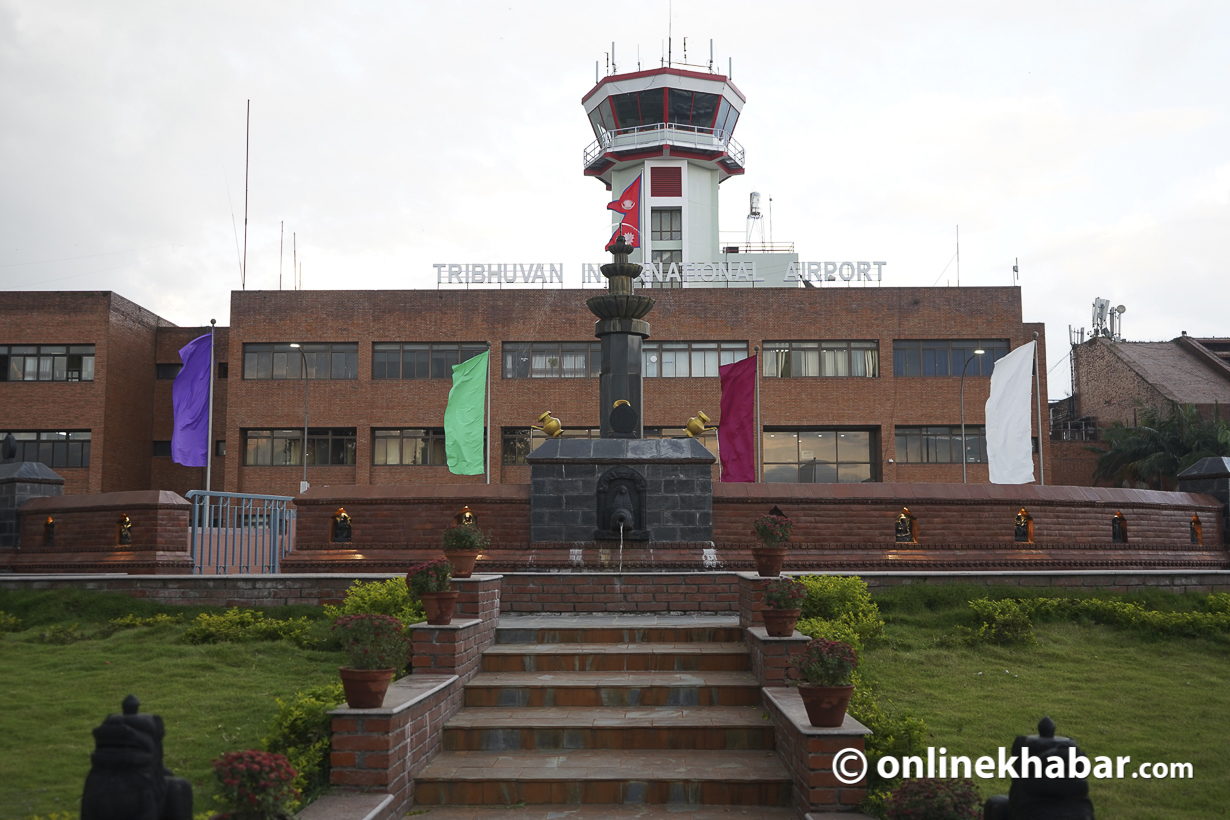
The Tribhuvan International Airport Customs Office in Sinamangal is under the leadership of joint-secretary Arun Pokharel who is also the Chief Customs Administrator of the Airport Customs Office. From his strategically-positioned office, which is on the southwest side of the first floor, he can oversee the entire customs area.
To oversee what is going on at the office, he has two large monitors mounted on his office walls displaying live feeds captured by IP cameras. One feed shows him videos of passengers arriving and departing from the airport whereas the second provides a direct view of cargo handling, tracking the movement of goods from the aircraft to the customs cargo building, as well as their entry and exit through the gate. All activities are recorded diligently.
After the live monitoring system was introduced in the Airport Customs Office in Sinamangal it was subsequently implemented across all 24 major customs offices in the country in 2019.
The system’s remarkable feature enables direct accessibility to live X-ray feeds not only in the office of the Airport Customs Office in Sinamangal but also in various other important offices. These include the office of the director general of the Department of Customs, the monitoring section, as well as the office of the Finance Minister and finance secretary.
Along with that, the Automated System for Customs Data (ASYCUDA) facilitates the viewing of customs documents, enabling a one-door approach that is streamlined and centralised to study and inspect all the documents.
Perfect on paper

Since customs has been the main source of income for the country, the Ministry of Finance implemented the Nepal Customs Automation System (NECAS) in about a decade ago to enhance transparency in the operations of its lower-level offices.
In the last two years of its implementation, this system has been gradually strengthening and evolving with numerous transactions that have been successfully pivoted to online.
Commenting on the system, an official said, “Regarded as one of the most robust among government agencies in Nepal, its implementation aims to prevent fraud at customs by providing robust monitoring capabilities for both goods and the accompanying customs documents.”
Despite the impressive features of the live monitoring system and its widespread implementation, its effectiveness came under question when a raid conducted by the Department of Revenue investigations resulted in the arrest of individuals for smuggling 100 kg of gold from the airport on July 19.
The arrested individuals include a suspended customs officer, an examiner, and an X-ray operator.
The X-ray operator Saroj Shrestha had examined a suspicious packet labelled as ‘break shoe’ using the X-ray machine and marked it ‘RC’ (recheck for re-examination).
However, during the preliminary investigation, it was discovered that Kumar Dhakal and Santosh Chand, involved in the examination, had opened the packet and allowed it to pass through customs without proper scrutiny.
And as per the aforementioned systems, there was a proper monitoring hierarchy already in place stretching to the Finance Minister.
But it astonished everyone as over 100 kgs of gold managed to get through airport customs despite all that extensive process. The incident revealed the existence of an organised smuggling network which had been at work for nearly a year.
Creating favourable conditions
The new guy
On Tuesday, undersecretary Sridhar Tandon served as the appraising officer of the branch responsible for checking gold at the airport customs. Having recently been promoted from a section officer to deputy secretary through an open competition, Tandon was assigned to the revenue administration. But on his second day in office, the gold hidden in the brake shoe was smuggled out of the customs office.
According to customs officials, there are suspicions that Tandon may not have been aware of the gold. Tandon stated that he received no briefing about the gold from the section officer or other officers under his leadership.
According to an official, the investigation officers are taking the matter seriously, as the newly appointed officer managed to pass the gold through customs without further scrutiny from higher authorities. The official expressed concern that if there is an officer who is not familiar with the duties of the office, it could inadvertently facilitate gold smuggling activities.
The boss’ day off
On the day the gold successfully passed through customs, the department was lacking leadership, as the office’s chief, Arun Pokharel, had been on a two-month leave. His approved leave period started on July 2 and was extended until August 31. He has been on leave ever since the police started investigating the case of 9.5 kg of gold being smuggled through vapes from the airport on December 25, 2022.
Pokharel, who had taken the initiative to request the Central Investigation Bureau (CIB) of Nepal Police to investigate gold smuggling, suddenly took an extended emergency leave citing health reasons after providing his statement. The department approved his leave to allow him to undergo therapy for back pain. He was asked to stay in Nepal but Pokharel is currently not in the country.
Now police say the gold hidden in the vapes was removed and sold by customs employees has sparked significant concerns. In response, the department initiated an investigation, suspecting that the gold might have been tampered with and potentially earmarked for smuggling.
While Pokharel is away, undersecretary Narad Gautam assumed the role of acting head. Despite the recent controversy, Gautam has not been in communication with the department. And this absence has clarified how disorganised the department is and questioned its transparency.
What is even more disturbing is since Pokharel took leave from office on July 2, 980 brake shoes were imported into Nepal in five separate shipments. The total weight of these imports amounts to 899 kg. Investigators do not know gold was smuggled through these shipments.

Head of security on leave
Although it seems like a coincidence, the head of airport security DIG Arjun Chand Thakuri was also on leave during this gold smuggling controversy. His one-week leave was approved by Metropolitan Police Office Ranipokhari. He had been on approved one-week leave citing family reasons, since Tuesday afternoon, as his regular holiday.
Thakuri’s absence has come under scrutiny as it appears to have boosted the confidence of smugglers due to a perceived lack of oversight and security. The increased morale among smugglers during his absence is a matter of concern and is being closely examined by authorities.
No leader
Prior to the new budget, the Ministry of Finance, Prakash Sharan Mahat, left the customs department, which is a significant source of revenue for the country, without a leader. This occurred after Chakra Bahadur Budha, the former director-general, used his influence to secure a transfer on May 13. Consequently, the department remained without a director-general until May 31.
Deputy director general Semant Pokharel was entrusted with the operational responsibilities. However, it is worth noting that during this period, Ready Traders, a company linked to gold smuggling, began importing goods for the first time. This occurred on May 17, which was the third day since the department was left without a leader.
According to the sources, the company’s initial import on May 17, consisted of 200 shaving shavers weighing 66 kg. Following this, the company conducted 28 more imports, bringing in shaving machines, brake shoes, and motors.
On May 31, in response to the leadership void, the Ministry of Finance appointed Shobhakant Poudel as the new director general of the customs department.
Broken system
As mentioned above, Finance Ministry had access to the monitoring system along with the finance and revenue secretaries. But the system seems to have been broken at the Finance Ministry for over a year.
A source from the customs says, “After the ASYCUDA system was said to be slow, the direct IP video monitoring system was removed from the Ministry.”
According to an official, the subordinate customs offices have a practice of retaining video records and photos for approximately three months. These records are then submitted if they are deemed necessary or if any relevant incidents are discovered. However, it is worth noting that Dhaniram Sharma, the spokesperson of the Ministry of Finance, expressed ignorance about this matter, indicating a lack of awareness or information regarding the specific practice.
Outsider with access
Rajendra Rai was arrested with the gold. Sources say Rai entered customs to facilitate the clearance of smuggled gold. However, it was later discovered that he was not a legitimate customs agent, raising suspicions about his activities and connections to the smuggling operations.
According to people who know him, Rai had a modus operandi where he would claim to be representing his clients from abroad and offer money as a commission to facilitate the clearance of goods. This allowed him to obtain clearance for his clients without going through the regular customs procedures. However, it has now come to light that he had a previous history of being involved in gold smuggling and had even served jail time for this offence in the past.
“Customs agents have access to fill out declarations,” says an expert, “Rai did not have anything like this. Earlier, he was a representative of the agent, but after his arrest, it was also taken away.”
Rai, who is known as the kingpin of gold smuggling in the Sinamangal area, had easy access to the customs office.
Inside job?

Preliminary investigations into gold smuggling in Nepal have uncovered two common methods used by smugglers: first, bringing the gold to Kathmandu and storing it there, and second, distributing it from the city. Authorities are now suspecting that the customs system may have been exploited to facilitate this illegal activity. The initial findings have revealed the existence of various networks involved in different stages of gold smuggling, with indications of the security mechanism playing an active role in these operations.
An official points out that the Ministry of Finance and the customs’ involvement has been questioned in the case where 100 kgs of gold were taken out from Tribhuvan International Airport that too through regular customs checks and aforementioned intricate processes.
The Department of Revenue Investigation (DRI), operating under the Prime Minister and Cabinet’s office, believes that the gold smuggling group did not merely rely on human error to pass the gold while bypassing the state-of-the-art customs monitoring system.
The evidence collected indicates that the suspicious transactions were not isolated incidents, and officials find it surprising that the entire system seems unaware of such repeated occurrences.
According to the investigators, the smuggler’s connection to the Ministry of Finance has played a role in facilitating gold smuggling into Nepal. Despite the presence of a state-of-the-art system and personnel employed to detect and address human errors at Sinamangal, the gold still managed to pass inspection.
According to the department source, “It appears that smuggled gold is transported to Kathmandu from a third country, the process is transporting it from the airport, storing it, selling it in the Nepali market or exporting it to another country. The department is simultaneously monitoring the group involved in each stage.”
From there, a portion of the gold is sold in local gold shops, while a significant amount is sent to foreign regions. This situation raises questions about the involvement of various agencies in the process. The source believes that such operations would not be feasible without the protection of the smuggler group within the system given the monitoring process.
Risk of evidence destruction

In the initial phase, the DRI achieved an 80 per cent success rate, recovering 100 kg of gold that had eluded the country’s police and state-of-the-art customs system through fraudulent means. However, the evidence is still at risk of being destroyed. “The first phase of gold smuggling was successful, but the challenge lies in tackling the system that enables favourable conditions for such activities,” a source revealed.
Upon further investigation of Ready Traders and its business, it is strongly believed the company was established for the purpose of smuggling gold. The evidence strongly points to the fact that the gold was smuggled in with the help of supporting agencies occupying key positions in various organisations. All this has left the department astonished.
While government agencies possess the ability to access documents, video footage of goods inspections, and detailed information about trading companies with just a click, the investigators suspect due to the silence and negligence of these bodies or their omission of duty such transactions are continuing. The source claims high-level briefings have reportedly taken place on this matter.
The customs department says the gold smuggling should be disassociated from its system.
Promising cooperation with the investigation to uncover the truth, DG Poudel stated, “We request all to not harbour excessive doubts. Hundreds of office workers across the country cannot be held responsible for the misdeeds of a few. The guilty parties should face consequences.”
This story was translated from the original Nepali version and edited for clarity and length.






















